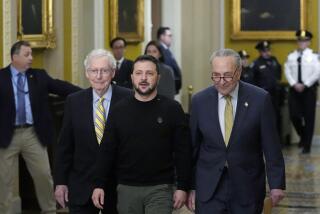Yeltsin Seen as Intent on Economic Reforms : Russia: No sharp turn expected in U.S. efforts to assist transition to capitalism despite incipient chaos.
- Share via
MUSCAT, Oman — After two days of meetings with Russian President Boris N. Yeltsin, senior U.S. officials left Moscow on Saturday unshaken in their conviction that Yeltsin will press ahead with economic reform and said President Clinton will ask for nearly $1 billion in Russian aid when he unveils his 1995 budget next month.
At the same time, officials said there would be no sharp shifts in the U.S. effort to help Russia make the transition to capitalism, even as that nation seems to totter on the edge of chaos.
Treasury Secretary Lloyd Bentsen and other senior Treasury officials, flying from Moscow to Indonesia with a refueling stop here on the shores of the Arabian Sea, told reporters Saturday that the $900 million that Clinton will ask Congress to award Russia in 1995 would build on existing aid programs. The U.S. allocation for Russia and the former Soviet republics in 1993 and 1994 is $4.1 billion.
The 1995 money would be directed at such programs as housing for soldiers redeployed from former Soviet republics and the nations of Eastern Europe that belonged to the Warsaw Pact; energy and environment projects, and business and student exchange programs, a senior Treasury official said.
With its extraordinary focus on economic matters, the presidential visit to the Kremlin was unlike any that preceded it, and it opened a new window for U.S. leaders on the course of political and economic reform--and the resulting anxiety and tumult--in Russia.
“The country has such great resources, such great people,” Bentsen said. “I think it will respond to a market economy. But it will have a bumpy ride.”
The summit also provided the occasion for at least three encounters between two key figures on opposite sides of the still-unresolved argument over how quickly the reform effort should proceed because of the political and social turmoil that it has brought.
Bentsen is on one side. Viktor V. Gerashchenko, the chairman of Russia’s Central Bank, is on the other.
In the United States, Bentsen has encouraged Yeltsin not to stray from the course toward full capitalism. In Russia, Gerashchenko has built economic speed bumps in Yeltsin’s path.
He has urged a slower course and, more importantly, has pumped out rubles and credit to unprofitable, inefficient Russian industries to keep them afloat.
Bentsen has argued that Gerashchenko’s actions have led to serious inflation in Russia. That inflation, although down from a monthly rate of 30% a year ago to 12% in December, erodes the purchasing power of people on fixed incomes and, in effect, simply transfers their limited wealth to the accounts of failing industries, Treasury officials argue.
Bentsen and Gerashchenko had brief exchanges during a reception at U.S. Ambassador Thomas R. Pickering’s residence, during a visit to the first Citibank to open in Moscow since its predecessor was closed immediately after the 1917 Bolshevik Revolution, and during a state dinner in the Kremlin.
Bentsen said Gerashchenko stressed the need for “gradualism” in redesigning the economy, and the Treasury secretary said he responded that “you have to move ahead with reform.”
In a lighter moment, at Citibank, the Russian banker looked at a computer screen displaying a program known as “Micro Banker.”
Demonstrating the distance between a money manager brought up under the Communist system and his capitalist counterparts, Gerashchenko cracked, in English:
“I understand the meaning of a bank. I like the words micro and macro , but not in economics. I don’t understand all this stuff about micros and macros.”
Indeed, aboard their airplane Bentsen and his aides developed their own wisecrack about Gerashchenko, echoing the punch line Bentsen used effectively against then-Vice President Dan Quayle in their 1988 campaign debate.
Much as Bentsen, then the Democrats’ vice presidential nominee, compared Quayle unfavorably to President John F. Kennedy, they compared the Russian banker to Alan Greenspan, the inflation-fighting chairman of the U.S. Federal Reserve Board: “I know Alan Greenspan. Alan Greenspan is a friend of mine. And Viktor Gerashchenko, you’re no Alan Greenspan.”
Gerashchenko’s role and the positions given to such reformers as the current finance minister, Boris G. Fyodorov, in the new government Yeltsin is forming in the wake of the Dec. 12 parliamentary elections remain uncertain. The result of Yeltsin’s bargaining over key personnel decisions with the Parliament, whose makeup reflects the gains of ultranationalists and others standing in the president’s way, will serve as a forecast of the pace of reform.
“It’s going to be a battle with Parliament,” Bentsen said. “I think there’s a sincere desire on the part of Yeltsin to follow through.”
Suggesting that Yeltsin has a stronger hand than might otherwise appear to be the case, Bentsen reflected his 22 years in the U.S. Senate when he said: “These fellows want to get reelected. They’ll be running again in two years. They’ll be talking about projects in their districts.”
Explaining the unchanged course the United States will follow in the wake of Clinton’s talks with Yeltsin, a senior Treasury official said the plan is to “build better from the blueprints we have rather than creating new blueprints.”
What it boils down to is this: an awkward quid pro quo in which international lenders will pace the delivery of assistance to the speed with which Yeltsin and his government institute the painful economic reforms.
If carried out too quickly, the reform measures further threaten Russia’s tenuous political stability. If too slow, the lenders delay the delivery of the much-needed aid out of concern it would be squandered on inefficient operations.
More to Read
Sign up for Essential California
The most important California stories and recommendations in your inbox every morning.
You may occasionally receive promotional content from the Los Angeles Times.













